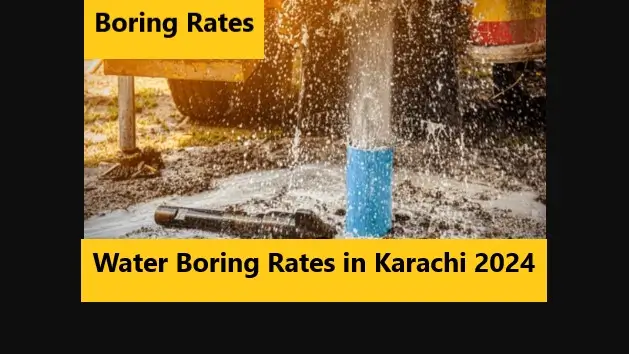Water Boring Rates in Karachi 2024
Water Boring Rates in Karachi 2024.
Karachi Water Crisis: A Deep Dive into Water Boring Costs (2024)
Karachi, Pakistan’s bustling megacity, is battling a severe water crisis. With a population exceeding 20 million, the demand for water far outstrips the meager supply of approximately 550 million gallons per day (MGD).
This shortfall has residents turning to a crucial, yet temporary solution – water boring.
Read More: Commissioner Karachi Announce Rates for Roti & Naan
Understanding the Crisis:
Several factors contribute to Karachi’s water woes:
- Mismanaged Infrastructure: Deteriorating sewage systems and inadequate urban planning lead to water wastage and inefficiencies.
- Overcrowding and Resource Strain: Karachi’s rapid population growth puts immense pressure on existing water resources.
- Funding and Corruption Challenges: Limited funding for infrastructure development and mismanagement further exacerbate the crisis.
- Climate Change: Changes in weather patterns can disrupt rainfall and contribute to water scarcity.
The Rise of Water Boring:
Faced with water shortages, Karachi’s residents are increasingly resorting to water boring, also known as well drilling. This involves drilling into the earth to tap into underground water reserves (aquifers). While it offers a temporary solution, water boring comes with its own set of considerations.
Water Boring Costs in Karachi (2024):
The cost of water boring depends on two key factors: depth and diameter of the bore. Here’s a breakdown of typical rates for an 8-inch diameter bore:
- First 600 Feet: Rs. 600 per foot
- 600 to 800 Feet: Rs. 800 per foot
- 800 to 1,000 Feet: Rs. 1,000 per foot
Costs escalate significantly if the bore diameter is widened to 12 or 15 inches.
Beyond the Cost: A Look at Sustainability:
While water boring offers a lifeline during the crisis, it’s not a long-term solution. Excessive groundwater extraction can deplete aquifers, leading to future water scarcity.
The Road Ahead:
Addressing Karachi’s water crisis requires a multi-pronged approach:
- Infrastructure Improvement: Modernizing sewage systems and improving urban planning are crucial for efficient water management.
- Sustainable Water Management Practices: Conservation efforts, rainwater harvesting, and exploring alternative water sources are essential.
- Demand Management: Raising public awareness about water conservation through education and awareness campaigns can help reduce overall demand.
Finding a Solution:
Karachi’s water crisis demands immediate action. By understanding the costs and limitations of water boring, coupled with long-term infrastructure development and sustainable water management practices, the city can chart a course towards a water-secure future.
Note: The information above might not be accepted 100%. Please verify from your own sources. We will not be responsible for any kind of loss due to our content.
For more news, please visit Munafa Marketing.




